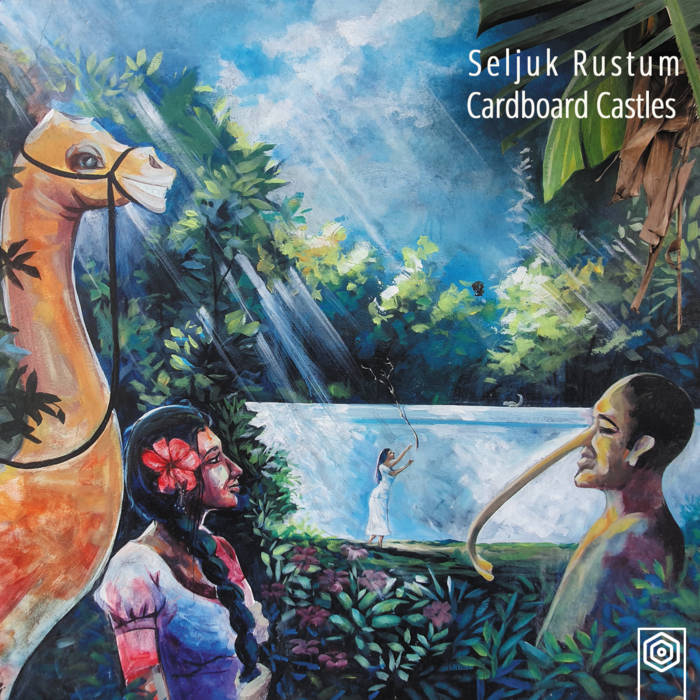The Breakdown
Womad used to run the strapline ‘bringing you the best music you’ve never heard’. Well the sonic explorers at Hive Mind Records are working on their own version of the same mission. Theirs is an internationalist mindset, navigating the rich expanse of contemporary global music and sharing the work of forward thinkers with a similar passion for what the label smartly call “borderless sound”. Following a refreshing wave of consistently head-turning releases in 2022, including M.Takara & Carla Boregas, Yara Asmar and Gustavo Yashimura, Hive Mind’s first album release of the new year provides another essential boost. ‘Cardboard Castles’ by the multi-talented Seljuk Rustum, an artist based in Kochi, South-West India, is available from 3rd February, a spring-heeled, subtly inventive, warmly textured start to the listening year.
As a painter, theatre practitioner, sound artist, producer and self-taught musician (on saxophone, guitar, synthesiser and percussion), Seljuk has that rare creative intuition which enlivens any project. Musically he’s worked with free-jazz guitarist Otomo Yoshihide, Indonesian avant duo Senyawa and alt singer-songwriter Eiko Ishibashi and more, all like-minds at the confluence of world, electro-acoustic, experimental and electronic tributaries. Now on ‘Cardboard Castles’ his first physical release in his own right, those elements mingle with his Indian traditional and folk touchstones to bring us something singular and deliciously unique.
Opener Body Of A Dolphin, Breasts Of A Cloud moulds all of the elements informing Seljuk Rustum’s music into a fluid, seamless form. The delicate minimal acoustic guitar and trembling violins of Kochi’s own string orchestra bring a tactile calm and breezy beauty that shimmers through the tune. The pastoral atmosphere unfolds, with undercurrents of a raga drone and birdsong plus whispers of new age seventies folk (yes Isaac Guillory) drifting alongside. It’s deeply affecting music that dismisses any need to pin it down to a type.
That eclecticism is at the heart of Cardboard Castle’s charm. Export Quality tingles with far-eastern, Pan Asian acoustic delicacy perhaps nodding to the port cities of Seljuk’s home province and their historical bond with trade from the Orient. The plucked strings, soft flutes, eerie fiddle sounds and steady chimes provide a gentle bustle over some scattered electronics. Meanwhile Desi Bunny brings things closer to Indian tradition with its whirling raga drones, breathy harmonium song line and wristy tabla throb before building into a rolling electronica chug, ready for any chill zone.
It’s clear that contemporary experimental twists are an instinctive part of Seljuk Rustum’s sound world. He doesn’t set out to follow a particular fusion path, the direction just comes naturally to him. The minimal, short phrase conversations between ocarina whistles, sax, and fiddle sounds on Fallen Sky begin simply enough but they soon rise intricately to a more wide-screen, above cloud altitude. Oriental Doom (Paper Rocket Migration Dreams) also scales up imperceptibly with a stately processional grandeur around fluttering synths and orchestral percussion. It’s got that same illusive otherworldliness and post rock fragility that Bon Iver strived for on in that post ‘For Ever Emma’, pre vocoder period, so some achievement.
The consistently strong impact that Cardboard Castles creates is even more impressive in the context of the album material being accumulated over an extended period from 2016 and 2021, amidst Rustum’s many other projects. Add to that the fact that most final cuts are improvised, single take recordings and the album’s success becomes even more beguiling. There is a magic here sustained by the artist sticking to his improvisational approach and revealed in the how spontaneous everything feels. Things don’t get messy on Cardboard Castles, they just feel very much alive, with the title track playing into the arms of that descriptor. From the innocent simplicity of the childlike piano and chimes, the bulbous bass-line slouch then through to the stuffy TV voice samples (“Suppose you had lived a hundred years ago”) there’s been a freedom to embrace the unexpected here….and it works.
Other surprises are never far from the surface on the album. The mechanic gamelan pulse, electronic sonar and snakey Shenai spells that seamlessly meet on The Dancer Is Seen And Not Heard and the concrete angles and edges of the stark almost jazz, almost spiritual Zen Coma, both circle around the memory. Then there’s the quirky, anglo-psyche feel on the album’s nearest take on a conventional song The Happiest Country Has No History. A lilting folk tune complete with brass band blasts and bluesy slide licks, it tells a quizzical, cross-lingual tale that shamelessly touches on “KFC“, “Uncle Tipsey” and “Scooby-dooby“. Eccentric, tongue-in-cheek, affectionate probably all these rolled into one, its place on an album as wildly individual as ‘Cardboard Castles’, could never be in doubt.
Released on CD, Seljuk’s choice because of its prevalence as a release format in India, and featuring on the cover a stunning mural from Palayam Market in the southern city of Kozhikode, ‘Cardboard Castles’ has authenticity covered. An album that’s really fresh, intriguing and fulfilling. Music that doesn’t pretend to be anything but itself.
Get your copy of ‘Cardboard Castles’ by Seljuk Rustum from your local record shop or direct from: https://seljukrustum.bandcamp.com/album/cardboard-castles














No Comment